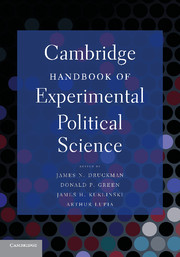Book contents
- Frontmatter
- Contents
- List of Tables
- List of Figures
- Contributors
- Acknowledgments
- INTRODUCTION
- PART I DESIGNING EXPERIMENTS
- 2 Experiments
- 3 Internal and External Validity
- 4 Students as Experimental Participants
- 5 Economics versus Psychology Experiments
- PART II THE DEVELOPMENT OF EXPERIMENTS IN POLITICAL SCIENCE
- PART III DECISION MAKING
- PART IV VOTE CHOICE, CANDIDATE EVALUATIONS, AND TURNOUT
- PART V INTERPERSONAL RELATIONS
- PART VI IDENTITY, ETHNICITY, AND POLITICS
- PART VII INSTITUTIONS AND BEHAVIOR
- PART VIII ELITE BARGAINING
- PART IX ADVANCED EXPERIMENTAL METHODS
- AFTERWORD
- Name Index
- Subject Index
- References
4 - Students as Experimental Participants
A Defense of the “Narrow Data Base”
Published online by Cambridge University Press: 05 June 2012
- Frontmatter
- Contents
- List of Tables
- List of Figures
- Contributors
- Acknowledgments
- INTRODUCTION
- PART I DESIGNING EXPERIMENTS
- 2 Experiments
- 3 Internal and External Validity
- 4 Students as Experimental Participants
- 5 Economics versus Psychology Experiments
- PART II THE DEVELOPMENT OF EXPERIMENTS IN POLITICAL SCIENCE
- PART III DECISION MAKING
- PART IV VOTE CHOICE, CANDIDATE EVALUATIONS, AND TURNOUT
- PART V INTERPERSONAL RELATIONS
- PART VI IDENTITY, ETHNICITY, AND POLITICS
- PART VII INSTITUTIONS AND BEHAVIOR
- PART VIII ELITE BARGAINING
- PART IX ADVANCED EXPERIMENTAL METHODS
- AFTERWORD
- Name Index
- Subject Index
- References
Summary
An experiment entails randomly assigning participants to various conditions or manipulations. Given common consent requirements, this means experimenters need to recruit participants who, in essence, agree to be manipulated. The ensuing practical and ethical challenges of subject recruitment have led many researchers to rely on convenience samples of college students. For political scientists who put particular emphasis on generalizability, the use of student participants often constitutes a critical, and according to some reviewers, fatal problem for experimental studies.
In this chapter, we investigate the extent to which using students as experimental participants creates problems for causal inference. First, we discuss the impact of student subjects on a study's internal and external validity. In contrast to common claims, we argue that student subjects do not intrinsically pose a problem for a study's external validity. Second, we use simulations to identify situations when student subjects are likely to constrain experimental inferences. We show that such situations are relatively limited; any convenience sample poses a problem only when the size of an experimental treatment effect depends on a characteristic on which the convenience sample has virtually no variance. Third, we briefly survey empirical evidence that provides guidance on when researchers should be particularly attuned to taking steps to ensure appropriate generalizability from student subjects. We conclude with a discussion of the practical implications of our findings.
- Type
- Chapter
- Information
- Cambridge Handbook of Experimental Political Science , pp. 41 - 57Publisher: Cambridge University PressPrint publication year: 2011
References
- 331
- Cited by



